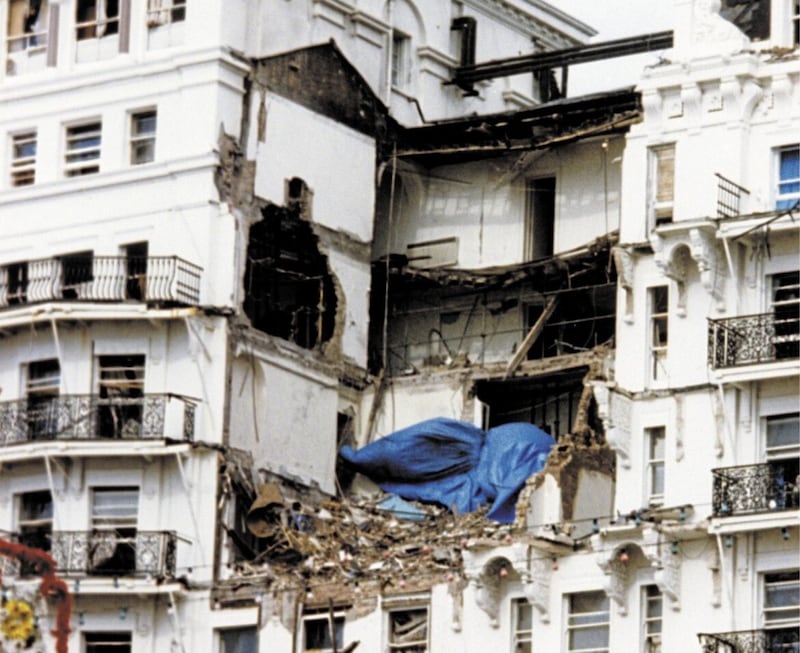I was watching ‘Bombing Brighton: The Plot To Kill Thatcher’ on the BBC this week.
It’s already been done a million times so I am not going to rehash the politics and the rights and wrongs of that whole era, but one statement from Margaret Thatcher did jar with me big time.
Amidst her trenchant condemnation of violence, she turned to the cameras the morning after the bombing and stated that she had always supported calls for the death penalty and the return of hanging.
Think about that for just a second… Thatcher condemns violence but supports execution? Not a bit of a contradiction there?
However, let me digress for a while, and I’ll come back to that.
I used to be a regular panellist on Highland Radio. For about 20 years I would travel up on a Friday morning to Letterkenny to review the events of that week. And I learned one thing very quickly. If the programme was flagging and there was little interaction from the listeners, just mention abortion and the switchboard would light up like down-town Hong Kong.
It worked every time. Indeed, I recall the phone system got overloaded so badly it jammed entirely.
And some of those debates were a real eye-opener as to just how reactionary people could be.
Many of those who were outraged at abortion, and were adamant it was wrong in all circumstances, would then spout about how we needed a return to old-fashioned values like longer prison sentences and would rarely, if ever, rule out the death penalty.
It seemed they wanted a return to ‘the good old days’ when people had respect for their elders and for the Church.
Those Highland Radio listeners, mainly Catholic I would have presumed back then, had a mirror image in the Protestant community where the DUP were regular advocates at Westminster for the return of state-sponsored death.
In 2011 the party’s five MPs tabled an Early Day Motion calling for the matter to be discussed on the floor of the House of Commons.
David Simpson, Sammy Wilson, Jim Shannon, Gregory Campbell and Jeffrey Donaldson said the death penalty had not been debated since 1998 and called for parliamentary time to be set aside.
In a joint statement they said: “Recent horrific crimes throughout the United Kingdom have led many to question whether there are certain criminals whose crimes demand such a sentence. With victims’ families having called for the death sentence as an appropriate punishment, we should be turning our minds to whether our justice system deals appropriately with certain criminals.”
The DUP, of course, was not alone.
Across the pond Donald Trump has frequently used the issue to bolster his support base.

The former US president famously took out full-page ads in New York newspapers calling for the return of the death penalty in the aftermath of a 1989 attack on a white female jogger, which saw five black and Hispanic youths sent to jail.
It later emerged they were totally innocent and had been falsely accused. They were five young men in the wrong place at the wrong time.
Indeed, in his final months in office in before losing to Joe Biden, Trump went out of his way to speed up executions across the States in the hope that it would be red meat for his tribe.
So, to get back to Thatcher, her stance on violence was total hypocrisy. No ifs, no buts.
Like many in the British establishment, she had zero problem with the SAS shooting dead unarmed IRA volunteers in Gibraltar.
It’s highly unlikely too she was unaware of the actions of the Glenanne Gang, comprising of British agents, RUC and UDR members as well as loyalist paramilitaries, who murdered around 120 Catholics between 1972 and 1978.

And if anyone cares to check out the Falklands conflict and the sinking of the Belgrano ship on Thatcher’s orders, that too should prove enlightening.
And it still goes on.
Just a few days ago Robert Jenrick, one of the contenders for the Tory leadership, claimed that British forces were “killing rather than capturing terrorists”.
Amidst outrage at the besmirching of the good name of British forces, Jenrick refused to back down, blaming the protections of the European Convention on Human Rights for the killings, rather than the actions of soldiers themselves.

Another of the Tory hopefuls, former home secretary James Cleverly, was outraged by the comment, stating: “The British military always abides by international humanitarian law, the law of armed conflict.”
Yeah, right.
I would suggest he comes over to the Bogside or Ballymurphy and tries telling that to the people there.
It’s simple: there is zero difference between a state carrying out a killing or a so-called terrorist doing the same. Just because someone is wearing a uniform doesn’t alter that moral reality. If all human life is sacred then all human life should be protected.
Thatcher seemed to think differently.




